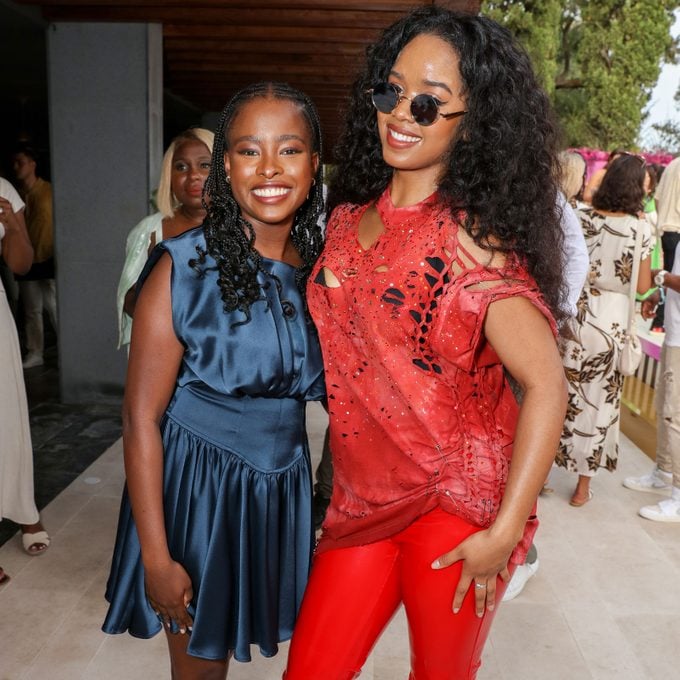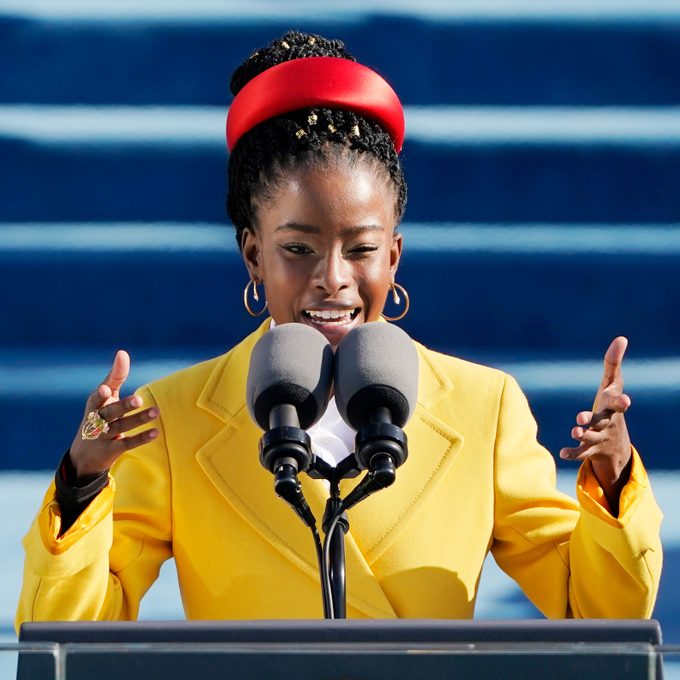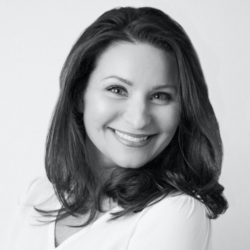Amanda Gorman Wants You To Run
Updated: Mar. 22, 2024

The #1 New York Times bestselling author and US Presidential inaugural poet is backing women and girls in a fierce new movement—literally and figuratively.
A professional poet’s work is contemplative and still, right? Long hours writing quietly, and, in Amanda Gorman‘s case, reading that work before global audiences at historic events.
That may be true, but Gorman’s work is famously proof that she’s out living in the world with us. Just before winning the NAACP Chairman’s Award on March 16, the 26-year-old writer and activist talked with The Healthy @Reader’s Digest about why she’s encouraging participation in the first-ever Every Woman’s Marathon on November 16, 2024 in Savannah, GA. A representative for Every Woman’s Marathon tells us the race is “the only marathon in the U.S. for women, by women, designed to unite runners of all levels, abilities, and backgrounds in an inspiring, community-driven wellness weekend.”
Why is a marathon for women so noteworthy? A very brief history: American women gained the right to vote in 1920, and only in 1972 could register to participate in endurance races. (This year happens to mark the fiftieth anniversary since an American woman could first obtain a credit card without a man’s co-signature in 1974.)
In January 2024, Milk—as in the national Milk Processor Education Program that ran the legendary “Got milk?” campaign—launched registration for Every Woman’s Marathon to respond to the reported trend that “most female runners still feel that most endurance races cater to men more.” They add, “Nearly nine out of 10 female runners expressed the desire for races that embrace diverse athletic abilities, body types, disabilities, and ages … Milk is breaking the mold to create an inclusive, beginner-friendly race tailored to the unique needs of women at every stage of their running journey.”
Representatives say Every Woman’s Marathon is not a traditional race: “It’s a full wellness weekend in Savannah with a lineup of curated activities from cooking and yoga classes, live performances, and insightful panels to child care, fully stocked porta potties, and more during the race and throughout the weekend.” Milk says they’re donating $1,000,000 to charitable organizations supporting women and girls in part by matching runners’ registration fees to organizations like 261 Fearless, Black Girls RUN!, Girls on the Run, and more.
A lauded voice for women and marginalized groups, Amanda Gorman penned the marathon’s mantra and told The Healthy @Reader’s Digest why this kind of movement matters. Stay up on what’s happening in wellness when you get The Healthy @Reader’s Digest newsletter in your inbox each day.

The Healthy @Reader’s Digest: We were delighted to see you partnering with an event that brings attention to physical activity for women.
Amanda Gorman: It was actually really interesting because the Milk team reached out to me about this idea of having a woman’s marathon really oriented toward women’s needs and capabilities. I was nervous because I was like, “I’m not an Olympian, I’m not a competitive athlete—so how do you envision me working on this?”
I was really compelled when they mentioned they wanted this to be accessible and welcoming for women of all body types and also of all experience with running athleticism. As someone who is artistic and creative, and also just as someone growing up in modern society, I always felt a lot of insecurities around my body—particularly as a Black woman, where there’s such a stereotype of us being perpetual, unbreakable pillars of strength. So when Milk communicated the ethos of this, which was around How do we greet and celebrate everyone for showing up to the starting line?, that was something that I really felt like I could speak to poetically.
The Healthy: That’s so cool, and it’s exciting to see what a celebration of womanhood this is instead of the classic marathon, which, as inspiring as they are, are really just focused on those 26.2 miles.
Amanda Gorman: I absolutely agree. I think they’ve thought about all of the details that make a holistic experience when you show up for your body. You mentioned the yoga, the food, there’s also going to be music, which I love. All these things that tap into the entire journey of your senses when you are showing up for something demanding like that. I thought that was super inspiring because it adds this festivity that I personally always struggle with when it comes to really challenging your body for a long endurance test. So being like, Oh, there’s also going to be community and connection and joy—I think that’s where this marathon is going to draw most of its power from.
The Healthy: Do you consider yourself physically active?
Amanda Gorman: Yeah, I mean, I would not consider myself someone who would run a marathon and win or break records. Something that I’ve been navigating, particularly as I continue to go through my twenties, is: You have a job, which means you’re at your typewriter or at your desk for long amounts of time, even though that’s something that you value. How are there ways in which I can introduce movement throughout the day? It helps how I write, and also helps how I live. So I do do yoga. I do love walking, I do love dance, and I think I just have to have my own storyline where I learned to celebrate that as it is. I’m not trying to be someone who has gold medals at X, Y, Z. And there’s nothing wrong with that. I just don’t think that is my journey at this point in time. I don’t think I have the training for it, but I do think I have the dedication to really try to feed my body’s needs: Not just food and water, but creativity and expression through movement.
The Healthy: You wrote the mantra for the marathon, and in it, you say, When we run, that’s for ourselves, for our bodies, our healing, ourselves. That resonated for our team. Can you talk about what those lines mean to you?
Amanda Gorman: For sure. Those lines for me actually go far beyond running. That’s an example that I bring up in that particular verse because when I talk to a lot of women, and this includes me and my friends, when we take out time from our days to do things for nourishing our bodies or our minds—and that can be sleep, that can be eating, that can be taking a nice long walk or run—a sensation that we all feel a lot is guilt. How dare you get eight hours of sleep? How dare you take 30 minutes to take a nice walk or run when you could be cooking dinner or helping a family member or answering that email? So I think there’s something empowering and also radical about looking at the time with moving our bodies as unapologetically for ourselves—that we don’t have to have guilt or shame or stigma about preserving these moments as sacred, that we deserve to be in a community where our bodies are worthy and valued and there’s nothing inhumane or selfish about that. If anything, it helps us show up bigger and better for the fact that we’re part of.
The Healthy: With March being Women’s History Month, what is your hope for women and girls?
Amanda Gorman: This is kind of random, but my birthday is March 7th, and then International Women’s Day is March 8th. And March 7th is also the anniversary of Bloody Sunday, which most people might recognize as March on Selma, the racial riots [that took place on March 7, 1965 during the Selma to Montgomery marches for the Black right to vote].
The Healthy: And that’s your birthday!
Amanda Gorman: That’s my birthday. I think I was seven and I had all these kind of civil rights books. I’m looking through them and seeing the date and being gagged and gooped, as they might say, mostly because I really took that day to heart. I was like, “Oh, this is about me and I get to celebrate my birth. Yay!” And then looking at so much history that has taken place in March across the country, as well as a few years ago around March 7th, give or take, is when we started seeing a lot of schools close down from the pandemic and the first types of limitations arise around going out, et cetera.
All that is to say, when I think about International Women’s Day and also the politics of where we are in America and the world, I’m continually graciously reminded by my own birthday that we all have deep-rooted connections and intersections to those pasts and that we are all unequivocally born into a moment which can move us further than backward.
And so as I look to the future and the role that we have in implementing a society where women can be free and heard and do more than survive where we can thrive, I think it’s all of us claiming our birthright to be the change maker for tomorrow.
So I’d say I really support anyone who runs this marathon—and even if you aren’t doing the marathon, I think one of the best ways that women show up with our bodies is not just running the tracks but running to the polls. So I just encourage anyone to make sure that you are registered to vote. It’s not my job to tell you how to vote, but just that it is your right to participate in democracy if you would like. So if you resonate with that, we would love to see you at the polls.

The Healthy: We’re running to the polls right there with you. Amanda, what’s one self-care routine that you refuse to skip?
Amanda Gorman: Oh, that’s an interesting one. I struggle with this because I’m only now learning to be like, Wow, there are certain things you need that if you don’t preserve them, this is the way that it impacts you. But I think especially sleep: I am not the same person—and this is supported by science as well, not just personal experience, and also women’s stories—I am not the same person, thinker, friend, daughter, sister, poet as I am on a full night’s sleep. I love taking a nap in the afternoons and kind of just refilling the well. Instead of setting my alarm—you wake up at seven, or you wake up at eight, and that’s how it goes—I actually just set a timer for eight hours: You’re going to wake up when this eight-hour sleep opportunity is over, and that might be seven, that might be 8:30, but I’m going to base the alarm mostly on how much sleep I’m getting and not so much as This is the set time where people say you need to be productive and get up and yada, yada, yada.
It’s, What does your body need? Trying to keep that consistent so that my rhythms get a real chance to flourish and blossom.
The Healthy: You’ve made us so tempted to try that.
Get The Healthy by Reader’s Digest newsletter and follow The Healthy on Facebook and Instagram.
- If Katie Couric and This Body Part Are Still Synonymous? “I’m OK with It,” She Says
- New Study: This Calming Exercise Surpasses Cardio in Reducing Blood Pressure
- What To Eat After a Colonoscopy: An Expert Doctor’s 5 Foods for Recovery, and 5 To Avoid
- Lance Bass Gets Real About the Health Problem That Affects Him Every Day












